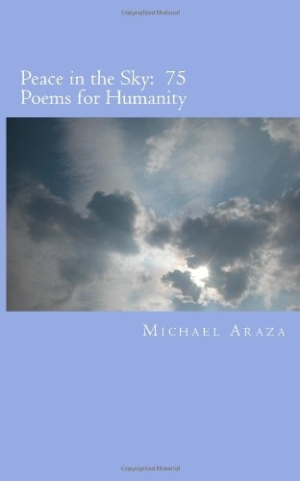
Peace in the Sky
75 Poems for Humanity
Contentment—it’s what we all seek, but it often proves difficult to find. Poet Michael Araza seems to have achieved a certain level of this sought-after state of mind, and he expresses it in Peace in the Sky: 75 Poems for Humanity.
Araza, who has published two books previously—Visions of Life and Peace for Humanity: 75 Poems for Enlightenment—describes himself as being “on a spiritual quest for hidden knowledge.”
Every one of the poems included in this collection follows a format of six lines each, which lends a consistency that helps give the pieces a spiritual feel (like a cross between a koan and an extended haiku). There’s no discernible rhyme or metric scheme in Araza’s poems, but the six-line form does help provide a sense of rhythm.
The problem is that, to paraphrase Tolstoy, many happy poems are alike, while each unhappy poem is unhappy in its own way. The English language seems to cater to multiple variations of unhappiness and discontent, while expressions of peace and happiness tend to blend into a single nebulous description, too often falling into the traps of cliché. In Peace in the Sky, statements like “I am one with life” and “I give testimony” are the norm. Araza does make an effort to offer different perspectives, but even a poem titled “Zebra” seems merely to serve as a different starting point for the same final destination: “Stripes of life, / It is a life filled without death. / Animals exist, / To express wishes. / I see the truth, / I am one with everything.”
There is a religious element present in Araza’s work, sometimes named explicitly (“God’s plan”), sometimes not. But Araza’s journey to this state of contentment, while tantalizingly hinted at, is seemingly whitewashed by his new sense of peace, as in the poem “To Die”: “I have risen again, / Filled with love for God. / This is a new beginning, / My intent is. / It was because, / Of betrayal.”
There’s not much of a progression to the poems; if there is a narrative, readers will likely feel that they have joined the journey halfway through, with some of the most interesting dramatic material already dead and buried. Clearly, Araza is concerned with more elevated matters now, but it might have been more effective to contrast the apparent state of near bliss that Peace in the Sky is written from with the baser human condition.
As it stands, Araza delivers a consistent message here, but the collection’s content feels like a whole that might easily be summarized into a handful of longer poems rather than seventy-five six-liners. It delivers what its title promises—poems from a higher place—and some readers will enjoy that, while others will wish Araza spent a little more time getting down to earth.
Reviewed by
Peter Dabbene
Disclosure: This article is not an endorsement, but a review. The publisher of this book provided free copies of the book and paid a small fee to have their book reviewed by a professional reviewer. Foreword Reviews and Clarion Reviews make no guarantee that the publisher will receive a positive review. Foreword Magazine, Inc. is disclosing this in accordance with the Federal Trade Commission’s 16 CFR, Part 255.
